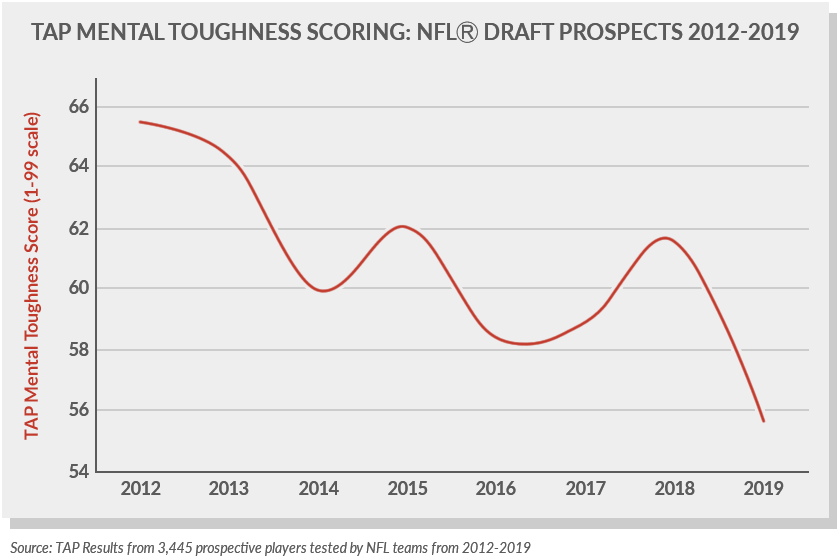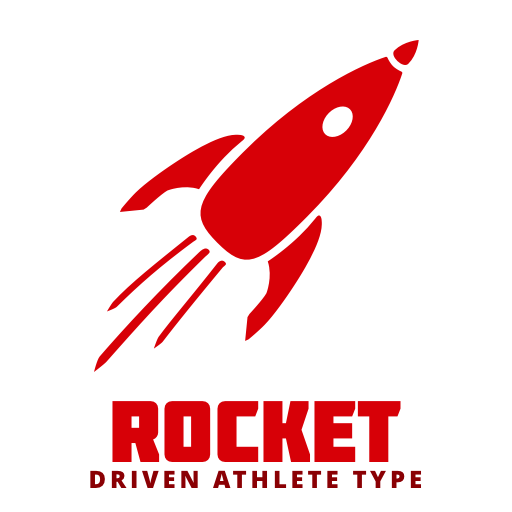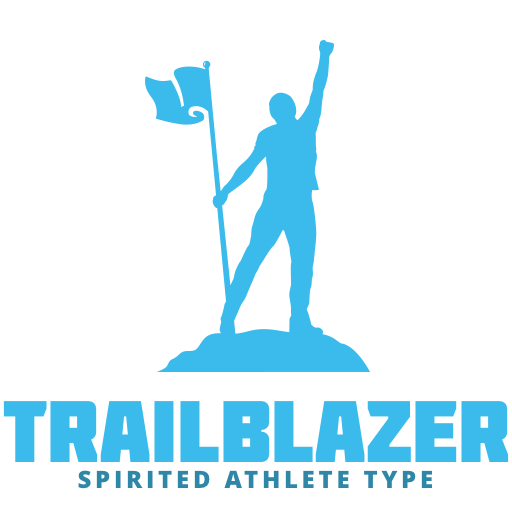We use cookies to ensure you the best experience. By using our website you agree to our Cookie Policy.
The TAP is an athletic mindset assessment that measures the mental intangibles important for success in sports. The TAP has a 30+ year track record of success in professional sports contributing to dozens of championships with such teams as the New England Patriots, San Antonio Spurs, and Kansas City Royals and is now available for use in amateur sports to help athletes and teams reach their full potential.
The TAP consists of just under 100 questions and one timed exercise. It takes approximately 25 minutes to complete. Upon completion of the online TAP, a rich array of output in the form of reporting results and development plans are available. This information leads to building champions.
The TAP has a 30+ year record of success in player personnel assessment and coaching with leading teams in the NFL, MLB, NBA, NHL, NCAA and also the US Department of Defense. Many professional championships have been won by teams using the TAP, including the New England Patriots, Kansas City Royals and San Antonio Spurs. As you can imagine, the TAP has many success stories that helped shape the history of the NFL, MLB, and more including:
Dr. Troutwine's 30+ years of scientific research and data resulting from working with elite athletes, coaches, and teams has proven, over and over again, that mental intangibles are tied to performance and overall success.
Coaches and athletes at all levels are waking up to this fact and are actively looking for tools and services to help with the mental game and provide them a competitive advantage. In parallel, there is growing awareness and demand for services relating to athlete mental health and wellness. Recent studies have shown that today's competitive athletes, both youth and collegiate, suffer from anxiety and other related mental health issues more than ever before. A recent NCAA survey showed more than 50% of college athletes suffer from overwhelming anxiety.
Yet, most of us have no idea on how to evaluate or approach the mental game. Today, it seems only the elite college teams or pros have access to a mental skills coach or sports psychologist.
It all starts with the TAP assessment. The TAP is like your personal mental "GPS" to success in athletics -- it tells you where you are currently and where you need to go to reach your full potential for success and well being.
Absolutely YES. Here's why:
Dr Troutwine has been involved in sports for five decades and has seen tremendous advancements in sports medicine, nutrition, athletic training, specialized coaching, technology, and equipment. For the most part, amateur athletes have been able to take advantage of these advancements resulting in this generation of athletes being the most physically gifted and technically trained ever. However, Dr. Troutwine noticed that there was one area where athletes were not making similar gains, in fact, they were actually getting worse. This was in their mental game. A historical look at the TAP database shows a clear trend that the athletes coming up through the ranks are weaker mentally than previous generations. See the chart below tracking Mental Toughness scoring from our recent NFL Combine participants:

This begs the question: Why are we producing athletes with lower mental toughness? Consider the environment for teen athletes today:
Today's Teen Athletes...
Resulting In...
Although Dr. Troutwine loves working with pro teams, and loves even more helping them win championships, this realization inspired Dr. Troutwine to dedicate a large part of the remainder of his career to building out tools and systems to help younger, developing athletes with their mental game.
Dr Troutwine firmly believes that athletics is a golden opportunity to mold young people with positive characteristics and life skills that will serve them not only in athletics and school, but for their entire life. The TAP ensures all the stakeholders in an athlete's development - the athlete, parent, and coach - are armed with the insights, tools, and techniques to be most effective with interactions, foster development, and optimize performance. This information helps all the stakeholders get the most from their experience in athletics while guiding the athlete towards reaching full potential in sports and in life.
In the first study of the original version of the TAP, NFL coaches independently validated that 85% of the player's profile statements were highly accurate.
During the "early" phase of the TAP, profiles were tracked in several ways. "Profile" here is defined as the interpretative report and the draft prospect's global evaluation generated from the test results. Profiles were compared to outcomes such as a player making a team, performance, etc. One clear finding was that later round picks who had positive profiles had a greater chance of making a team and playing in the NFL (p < .025).
TAP accuracy was further demonstrated by a study of basketball coaches and players where coaches were asked to identify their players based solely on the TAP reports (the names were redacted). This study of 3 coaches and 36 total players found the coaches were able to accurately identify 35 out of 36 (97%) of the players correctly based solely on their TAP report.
More recent studies have focused on specific sport performance statistics tied to TAP results. A combination of TAP traits was found to correlate with net yards/attempt for NFL quarterbacks. Another study showed certain TAP traits related to batting averages of MLB players. A third showed tennis serve accuracy among tennis players correlated to higher scores on a TAP scale.
The TAP is highly reliable, meaning a person's scores are very consistent, do not vary much from day to day. Reliability checks have yielded high figures, r = .92, (where a value of 1.00 would be perfect). This study derived from 92 players that took the TAP while a college player, then in a short amount of time, retook the TAP at the NFL Combine.
Yes. The TAP has been scientifically validated in a multitude of manners including:
Like other proprietary instruments in the field such as the Gallup StrengthsFinder, Dr. Troutwine has chosen not to publish the TAP assessment for peer review. This does not negate the TAP's validation. This decision instead protects the proprietary and confidential nature of the TAP and its scoring methodology. This is especially important for our clients in professional sports.
Dr Troutwine has developed assessments like the TAP for companies like Ford and Sprint that predict job performance. None of these assessments are published for public consumption; all have remained proprietary and confidential.
You can purchase the TAP while registering for an event through Ryzer. After purchasing, you will receive an email with a link to take the TAP. The email link does not expire and can be used at any time.
Once the assessment has been completed the results are automatically shared with the Ryzer users with access to the profile.
Athletes, their coaches, and parents can usually grasp the physical qualities of the athlete but are "blind" to mental qualities that impact athletic performance. The TAP shines a spotlight on these unknowns so that all stakeholders in an athlete's development - the athlete, coach and parent/mentor - are armed with the insights, tools, and techniques to be most effective with interactions, foster development, and optimize performance.
It is also quite enjoyable to take the TAP. Most people like learning more about themselves and the TAP will provide plenty of insight about what makes one "tick" including strengths and opportunities for improvement. Athletes, however, often report that they most enjoy learning their matched athlete "type" and which prominent pro athletes share their same type.
It takes approximately 25 minutes to complete. It is recommended that the TAP is completed in one uninterrupted session in a quiet setting with a strong WI-FI connection.
The TAP provides an array of results in the form of scoring metrics, graphics, and narrative text.
TAP results provide
TAP results for Athletes include
TAP results for Coaches & Teams
A statistical analysis was conducted on the TAP results of over 30,000 special forces soldiers & elite athletes, both male and female, in nearly all sports. At a broad level the data revealed a constellation of mental characteristics that clustered into 8 "types" that share common athletic mindsets, traits, strengths, struggles, inspirations and most-effective interaction styles. We gave them catchy names so they are easily remembered.








The matched Athlete Type is the first thing an athlete sees after completing the TAP. This important first impression is purpose-built to be a positive introduction to one's athletic mindset. The experience goes like this, "Cool, I am an Eagle just like Cat Osterman, Mike Trout, and Peyton Manning". The athlete can then look at the characteristics, strengths, and struggles of their matched type. They instantly have a positive kinship with multiple prominent athletes. Knowing certain pros have similar mental strengths AND struggles goes a long way to help younger athletes buy-in and feel not only comfortable but pumped about using our system.
The Athlete Type provide a high level overview of an individual's mental make-up.
Introduces a common framework for coaches and athletes to better understand and interact with one another.
Athlete Types provide a positive self-identifying image for athletes.
Most find it interesting and fun to learn their Athlete Type and share it with others.
When the TAP assessment is completed, our system immediately compares the individual's scores on the individual TAP scales to the scores of each of the 8 athlete types on all the same TAP scales to determine the closest match. To be more precise, we measure the scoring distance between each of the individual's TAP scale scores and the scores of the same TAP scales for each of the 8 athlete types. The athlete type with the smallest overall scoring distance from the individual, is the individual's closest matched athlete type. We represent the proximate match with a number between 1-99. The higher the number, the closer the match and the more characteristics of the type would be expected to ring true for the individual.
 Very Close Match
92 and above
Very Close Match
92 and above
Exhibits most of the type's characteristics
 Close Match
86 to 91
Close Match
86 to 91
Exhibits many of the type's characteristics
 Match
80 to 85
Match
80 to 85
Exhibits some of the type's characteristics
 Loose Match
79 and below
Loose Match
79 and below
Exhibits a few of the type's characteristics and is more of a unique individual than a common type
Yes, we see it in two common scenarios. First, when the athlete is immature and still developing their personality, they may evolve later into their true type. Second, many athletes are "hybrids" of multiple athlete types (their proximate match is similar distance from two or sometimes three types) and they may see a new top-matched type from TAP to TAP.
Traditionally, one of the biggest challenges with evaluating athletes on their mental game is the lack of objective standards. When you are dealing with something most coaches consider as "intangibles", by definition there is no way to objectively measure them. The TAP changes that thinking. With more than 30 years of research analyzing the TAP results of elite athletes, the TAP has been fine-tuned to accurately measure the mental intangibles important to success in athletics. This process involved Dr. Troutwine leveraging the evaluation protocols used by one of the most notable athletic events in the world, the NFL Combine and those used by one of the most elite special forces military units in the world, the US Navy SEALs. The result of this research and analysis allowed Dr. Troutwine to turn traditional mental intangibles into tangible, objective metrics that can be used for assessment, coaching, development, and comparison of athletes across all sports and levels of competition.

The mental intangibles in the two middle layers of the TAP Mental Intangibles pyramid in the above image are those published in our athlete reporting upon completing a TAP. These 12 "Performance Traits" are singled out from other TAP measurements because they are highly correlated to athletic success and are thus targeted for training and development.
This is the section where an athlete receives a personal evaluation and guidance directly from Dr. Troutwine. His 30+ years of research and analysis is leveraged to provide this custom analysis.
The athlete's results on TAP traits are used to produce text describing the athlete's makeup in 6 important areas:
The first 3 sections also include a list of 7 or more suggested activities for the athlete to work on to improve. Additional suggestions are often offered in the text of each section.
This is the section for the athlete's parent or mentor based upon the athlete's TAP results. Here, Dr. Troutwine provides custom narrative analysis so that the parent has a new-found understanding of their athlete. This information arms the parent with the insights needed to best help their athlete through the ups and downs of athletics.
Topics covered include:
For each topic, Dr. Troutwine also lists personalized suggested activities for the parent who wants to support their athlete the best way possible.